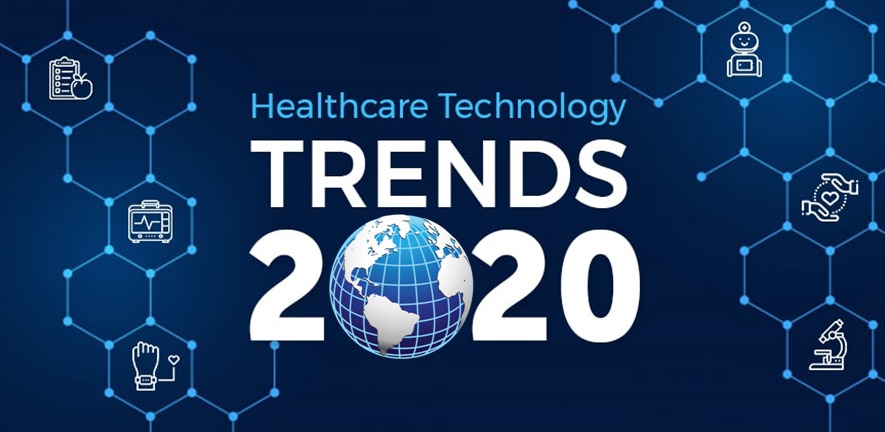
In the next decade, technological advancements will be heaping up one after another. Most trends that are emerging will revolutionize entire healthcare technology, redefine the upcoming market opportunities and overcome contemporary challenges. There are several trends in healthcare technology which will surge smart economy among these, few are listed below:
Artificial Intelligence (AI) in healthcare, Predictive analytics in healthcare, Blockchain application in Healthcare.
- Artificial intelligence in healthcare – Artificial intelligence (AI) is revolutionizing the healthcare industry. AI is development of certain systems which are capable of performing task that normally require human intelligence. AI has largest impact on healthcare and it has been possible because of abundant availability of medical data. AI is based on deep learning and machine learning which requires tons and tons of data and process data based on several parameters. However, the medical data available has numerous attributes, but by using deep learning and neural networks it has become possible to process high dimensional data. Application of AI can smoothen the process and give accurate results. Machine learning and deep learning algorithms can be used to evaluate the drug discovery process and help in production of new drugs.
- Some case studies where AI has helped Healthcare:
- AI has helped many healthcare institutions by implementing cognitive technology in order to unwind huge amount of medical records and perform power diagnosis.
- Nuance is a production service provider; it uses artificial intelligence to predict the indent of a particular user. By implementing Nuance in an organization system or organization workflow, a personalize user experience can be developed that allows a company to make better decisions & better actions that enhances the customers experience and thus overall, it will benefit the organization. Nuance basically helps in storing, collecting and formatting data in order to provide a consistent and faster access to data so that any type of analysis or diagnosis can be easily performed.
- AI also plays an important role in medical diagnosis with help of deep learning and neural networks. One major impact is on MRI scans; AI has completely taken over the complexity of MRI scans and made it a much simpler process. MRI scans are very difficult to analyse because of the information they contain. Researchers at MIT developed a convolution neural network called VoxelMorph that simplifies the MRI scan process and gives results in seconds.
- The market trend now is shifting from doctor-centric diagnostics to data-driven diagnostics which can only be possible with help of AI, but to adopt, AI companies need to understand the use, threats and opportunities, and other parameters. We have done a SWOT analysis for better understanding the impact of AI in healthcare.

- Predicative analytics in healthcare – With advancement of technology, predicative analytics has become very important and useful in prescription medicine, epidemiology and operational management. But predictive analytics has some benefits as well as some risks associated with it.

- Despite of the risks, it has overcome challenges to help plenty of healthcare organizations. Penn Medicine, Philadelphia-based healthcare system started using this technology for their palliative care. The program helped by identifying the patients who are at high risk of bad outcome when they go to the hospital, by collecting patient’s electronic health record. Predictive analytics also will emerge as a boon for medical imaging process. A team researchers at Stanford University developed CheXNeXt, an artificial intelligence algorithm which can screen chest X-rays in a matter of seconds to detect 14 different pathologies.
- Most of the companies believe that predictive analytics can deliver better care and also reduce operational cost.
- Demand for healthcare professionals has been rising but at the same time shortage of clinicians continue to grow. The gap of unfiled healthcare jobs is getting wider. In 2016, Avantas & AMN healthcare conducted a survey on nurses to manage nurse scheduling and staffing problems using predictive analytics. Predictive analytics can forecast patient demand and schedule nurse and overcome the staffing problem. Resource management using predictive analytics can overcome these problems with increased staff satisfaction, efficiency and cost reduction.
- Predictive analytics supports various dimensions of the healthcare industry including
- Patients – can access improved care by having customized treatment and also have transparent outlook
- Healthcare providers – benefit in providing optimized protocols for treatment, innovative services for patients and benchmarking with competitors
- Payers – using effective risk management system, payment fraud detection and demand management proper treatment can be given at reasonable price
- R&D – the timeline from drug discovery process can reduced by using predictive algorithms to accelerate the process
- Regulatory – population health management, sourcing financial resources and public health surveillance can be incorporated at a same time with accuracy
But some underlying risks in predictive analytics and statistical modelling may hinder the decision making process. Unless algorithms are monitored to understand human interfernce, they can be biased. However, the future demands are high end analytics models but aglorithms should be made more accountable and transparent to keep a check on human interventions.
- Blockchain technology in healthcare – On of the best use of technology in health care. Blockchain technology acts as a distributed ledger, all the information is stored in a decentralized way, so that nobody will have access to a user’s data without consent and data is immutable, that means no body can change it.
- According to a survey by Statistia, there has been a huge increase in the funding investment of Blockchain technology and in coming years this technology is going to expand and attain new height.


- Blockchain is no doubt an emerging technology but in order to understand the application of Blockchain technology in healthcare, SWOT analysis will help to identify the underlying opportunities and challenges.

- Some recent developments in healthcare industry

- The Blockchain market is very competitive, major players are Microsoft, IBM, Guardtime, Gem Health, PoKitDot which majorly focus on product innovation, collaborations and strategic alliances to create a strong foothold in the market.
- BurstlQ a platform to help healthcare companies by providing a platform to securely manage massive amount of patient data. The blockchain technology used in this platform has certain specific features like safekeeping and protection and license of data and has helped to root up the abuse of prescription drugs.
- Another blockchain company, Factom, created a platform that keeps a track of patient data and can be accessed only by hospitals and healthcare professionals only after patient’s permission.
- Due to miss communication between medical professionals, healthcare industry suffers loss of billion dollars every year. The process of obtaining patient’s data is very time consuming and sometimes delays the patient care. Using the decentralized technology, one ecosystem of patient data can be created and efficiently used by healthcare providers for faster diagnosis and treatment.
The next generation technology will definitely create authentic consumer experience and these will also result in improved inventory management, patient management and patient tracking. Building healthcare information models in smart ways will reshape the technology.
Innovations in healthcare technology will definitely change the face of industry, while most of the industry experts believe in Artificial intelligence, Blockchain technology, predictive technology and use of natural language processing will mainly depend on behavior of consumer and revolutionize the future.
For more information, please contact bbanik@pharmintel.co.in




Leave a Reply